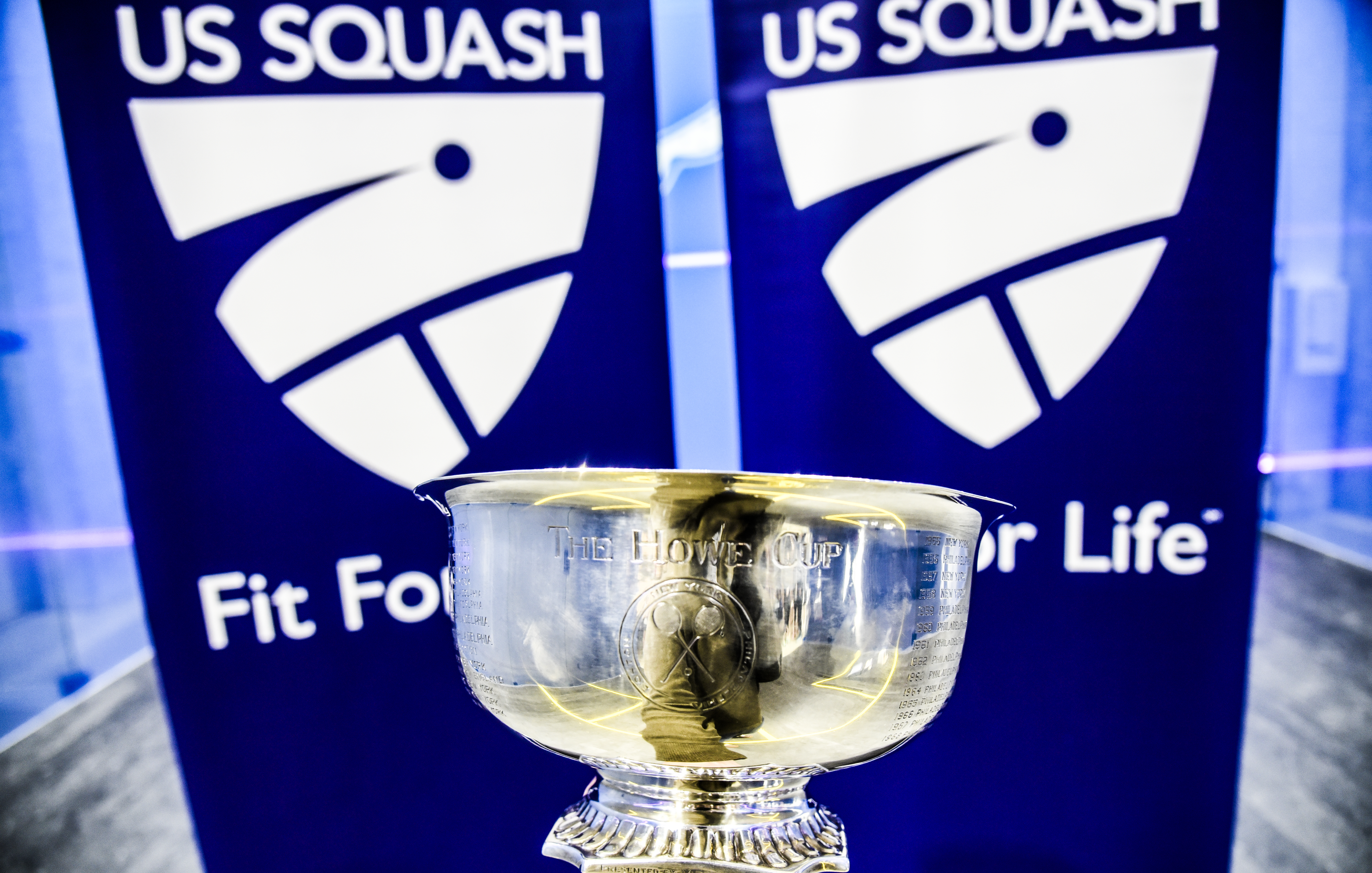by Haley Bloch and Jennifer Gabler
Squash Is Friendship captures the essence of the 2017 Howe Cup, which was played at Squash on Fire in Washington, DC last November. The tournament, founded in 1928, was a combination of fierce competition and high-energy
social connections.
The tournament marked the first national championship hosted by Washington’s
newest venue, the eight-court Squash on Fire. Walking into Squash on Fire for the Howe Cup was different than showing up to play at other tournaments. Where else could you run into many friends and still guarantee that you’d make new ones?
Perennial powerhouses Washington, New York and Philadelphia were there, but there but there was also wonderful diversity: a record representation from Canada with six teams, as well as five Seattle teams, three California teams, three Chicago teams and two Minnesota teams. Players ranged from beginners brand-new to the game, to mother & daughter combinations, to former collegiate champions and professional squash players. Ages ranged from twelve to seventy-five.
Women put the Howe Cup date on their calendars way in advance, regardless
of where they live. Teddy Weisz, on the DC team, made the trip from Thailand to play. Stephanie Bazin, the organizer for the Canadian teams, said they look forward to Howe Cup each year because “it’s a road trip with the girls. We love the idea of driving across the border and doing our best to take the Howe Cup back to Canada.”
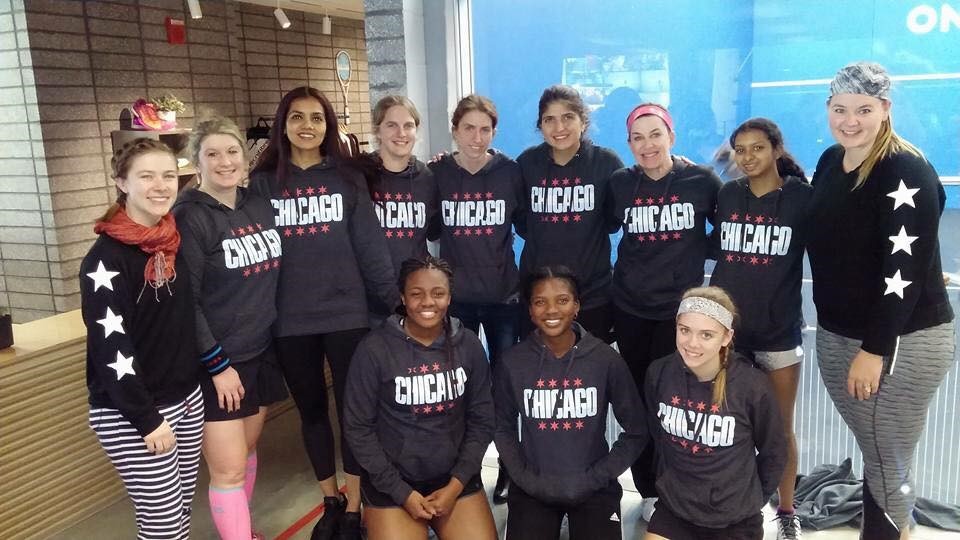
Sarah Ann Moore, Rohini Dey, Emma Charlton, Michelle Ward, Irene Maria Barillas, Mary Carter, Mehak Dey-kohli and Bryce Minetz
(l-r, front row) Makyla Kelley, Teri Hill and Emma Carter.
Eleven A division teams competed for the top prize at the Howe Cup. The
A division produced its first-ever California finalists, after The Ladies of the Olympic Club upset both the two and three seeds to reach the final. However, the top-seeded National Capital Squash Aces prevailed to win another title for Washington. “This year everything just clicked,” said Chanel Erasmus, a member of the NCS Aces who has played in the Howe Cup for Washington for the past three years since graduating from Trinity. “From the beginning we said this was going to be our year and it was time to bring the cup home. None of us wanted to let each other down, which also meant that we didn’t drop a single game all weekend. There is nothing quite like the energy that comes with having almost 300 women competing and battling it out to be crowned Howe Cup champions. The energy is palpable, there is an overwhelming sense of camaraderie, pride and girl power. It’s a truly amazing weekend.”
Bostonians claimed both the B and C division titles. In division B, the Boston Queen B’s upset top seeds National Capital Squash in the first round and went on to defeat the Chicago Griffins in a close 3-2 final. The Boston C Party defeated first-time finalists from Virginia, C’Ville Love, in the C division final. In the D division, the Philly One Hit Wonders were true to their name, winning Philadelphia’s sole title of the weekend—Philadelphia’s first division D title in tournament history.
A key component of the historic success of Howe Cup was the orphan matching process which pairs partial teams with individuals who want to play in the
Howe Cup but don’t have a squad from their local area. “The system of conference calls between regional organizers was key this year in matching up orphans to teams, particularly the urban squash girls,” said AJ Copeland, the 2017 Howe Cup director. “Our ratings committee reviewed team submissions and moved players to other teams and divisions to ensure that everyone got competitive matches. The robustness of the orphan matching system should be reassuring to cities that would like to try to send a team to the Howe Cup but aren’t certain they can field a full team of five in a given draw.”
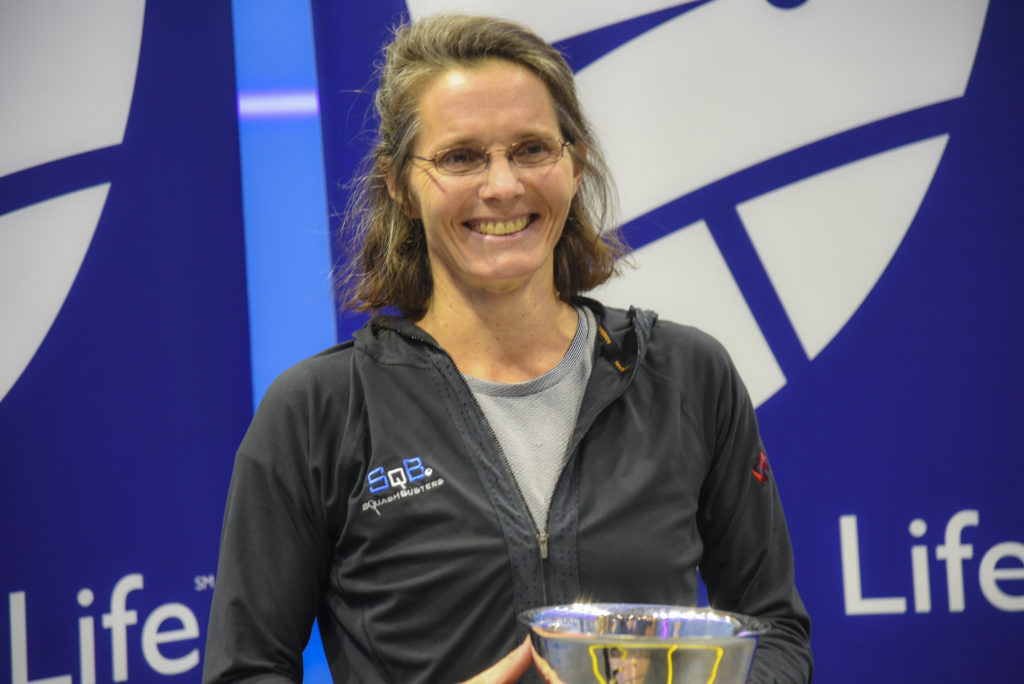
Feron’s Wedgwood Sportsmanship Award at the Howe Cup.
Caroline Nevin, an orphan high school player from Connecticut, was matched with the Boston Lobsters in the C division. “Playing with the Lobsters was an honor and a great experience. The Lobsters accepted me with open arms. I wouldn’t have gotten to know them nearly as well if I hadn’t been matched with them.”
A central initiative was to increase participation from less active cities. Chicago tripled their participation from last year’s Howe Cup and sent teams in the A, B, and C divisions. This was the first Howe Cup for over half of the Chicago players. Rooting on the players, Chicago parents, husbands, babies and friends made up the loudest cheering section at Squash on Fire. Balancing fun on the dance floor and competition on court, Chicago brought glow sticks to the famous Saturday night party and still battled hard in all three divisions, winning the A consolation final and taking second in the B division.
Another notable team was Minnesota’s Purple Reign. Last year they won the Howe Cup D Division. This year they sent six players to Washington, DC to play on B, C and D teams.
Girls from six urban programs—MetroSquash, SquashBusters, Squash Haven,
SquashSmarts, SquashWise and StreetSquash—teamed up with adults from
their cities to participate in the Howe Cup. They brought a vibrant energy to the weekend and enjoyed seeing so many women serious about their squash games.
“It’s hard to find women to play with, because squash is such a male-dominated sport,” said Suejona Miah, an eleventh grader at StreetSquash. “Even in [the New York City] league, we didn’t have that many matches against other women. Seeing so many women has shown me that I am not alone in this world. Howe Cup has broadened my horizons in many ways.”
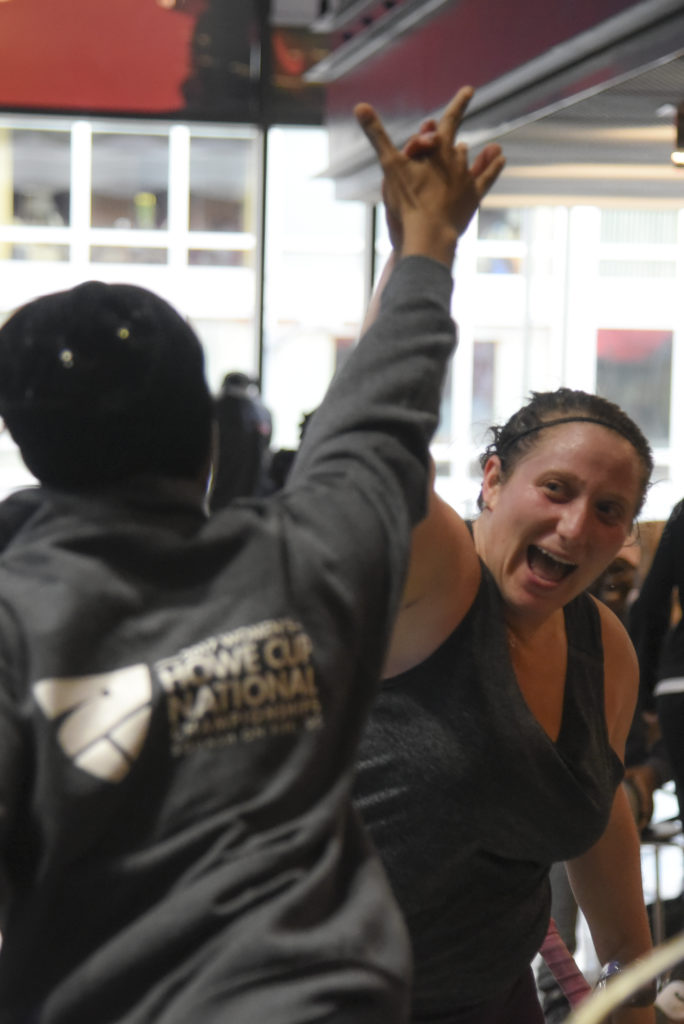
after an exciting win for New York.
Robynn Chutkan was a part of the DC Docs team—a squash team entirely composed of women from the medical profession. Robynne, originally from Jamaica, is a gastroenterologist on the faculty at Georgetown. She played as a child—her mother was a Caribbean champion—and then picked it up again when her daughter Sydney Mann started playing. “This Howe Cup was really special playing with Sydney,” said Chutkan. “She did great: three out of four wins. I didn’t fare so well: four losses. But Sydney was really sweet and encouraging, coaching me in between games and reminding me I needed to run more.”
“Even if you didn’t know someone and they weren’t on your team, they’d be cheering for you and giving you tips and encouraging you,” said Sydney Mann, now a 7th grader. “Dancing with my mom and the senior players at the party was really embarrassing because they didn’t know how to dance but they were all really nice so I was happy to be there.”
The Howe Cup creates connections between high school, college and local adult women players to encourage collegiate women to keep playing after college. “For Howe Cup 2017, I was placed on a New York team where my teammates and I quickly became a tight unit—warming up together, discussing our goals for the match, and cheering each other on” said Isabelle Weisman, who played on the Hamilton team a few years ago, “It functioned exactly like my Hamilton team. Playing in the Howe Cup gave me the collegiate feeling I have been missing.”
The bravest woman at the Howe Cup was Alix Cummin. Midway through the tournament, Cummin sustained a serious facial injury and lost several front teeth. She returned to the tournament on Sunday morning. “I was determined to get back on the court on Sunday,” said Cummin, who works as the high school academic director at SquashSmarts. “It was scary for me, but I felt it was very important, not just for my mental state, but also for my students who saw the incident. I wanted to tackle the fear I knew was inside, and I thought if I didn’t do it right away that it would fester and become larger. As a part of a team, I wanted to show my girls that if something knocks you down (literally in this case), the most important thing is to get back up and try again. The doctor who saw me on Monday said, ‘Oh, you’ve done a great job healing. You must have treated this correctly when it happened.’ And I laughed, and thought to myself, ‘Where else but at Howe Cup could you have a fantastic (female) trainer, lots of doctors who knew what to do and so many friends who reached out to support me.’”
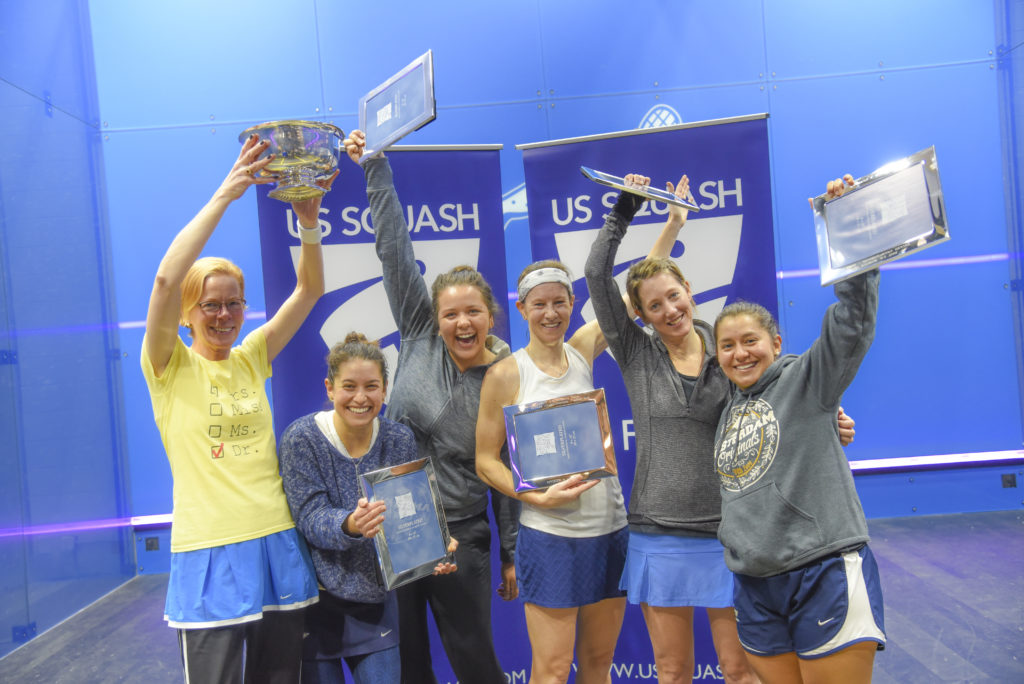
Julie Kessler, whose squash trajectory has taken her through all the levels of Howe Cup play, is a Howe Cup veteran. She started out as a Philadelphia
C player at the 2002 Howe Cup. This year she played the No.1 spot for the Philly A team. “I was introduced to squash by a friend who brought two squash racquets to our weekly racquetball game,” said Kessler. “That was the last time I ever played racquetball. I started taking lessons with Amy Milanek at Berwyn Squash, and Amy invited me to play Howe Cup in the No. 4 position on a C team in 2002. Since then, I have played on the C, B and now A Howe Cup teams for Philadelphia. In 2017, I played No.1 on our A team, which was the ultimate challenge for me both physically and mentally. The competition at Howe Cup is just a small part of the entire experience. It’s great to get together with old friends you only see once a year, as well as to meet new people. Howe Cup has given me the opportunity to become friends with people from all over North America. I look forward to Howe Cup to be able to reconnect with people that have the same passion for the sport as I do.”


